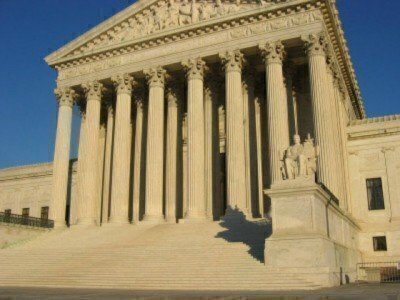The debate over recent remarks by a Supreme Court Justice about a presidential candidate has brought attention to a little-understood part of the judicial system, the Code of Conduct for Federal Judges.
 The code is published and updated by the Judicial Conference of the United States, the national policy-making office of the federal court system. The Chief Justice of the United States, John G. Roberts, Jr., presides over the conference. Its members include the chief judges of every federal circuit court, and other federal judges.
The code is published and updated by the Judicial Conference of the United States, the national policy-making office of the federal court system. The Chief Justice of the United States, John G. Roberts, Jr., presides over the conference. Its members include the chief judges of every federal circuit court, and other federal judges.
The conference worked with the American Bar Association on the code and it adopted the current Code of Conduct in 1973 when it was proposed by Chief Justice Warren Burger. The code has been revised eight times since 1973.
The full federal code applies to “United States circuit judges, district judges, Court of International Trade judges, Court of Federal Claims judges, bankruptcy judges, and magistrate judges.” It doesn’t apply to the Justices of the Supreme Court. (States have their own codes based on ABA guidelines.)
The federal code also provides advisory guidance using “ethical canons” for judges to whom the code applies. “The Code of Conduct provides guidance for judges on issues of judicial integrity and independence, judicial diligence and impartiality, permissible extra-judicial activities, and the avoidance of impropriety or even its appearance,” the conference says.
Supreme Court Justices aren’t required to observe the code. According to the Constitution, they serve as long as they exhibit “good behavior,” or face possible impeachment and removal for “treason, bribery, or other high crimes and misdemeanors."
In our history, most impeachment proceedings have involved federal judges. As of 2015, 15 of 19 officials impeached by the House were federal judges, and of 16 trials conducted in the Senate, all eight people convicted were federal judges.
Only one Supreme Court Justice, Samuel Chase, faced an impeachment trial in a politically charged environment during the Jefferson administration. In 1805, Chase was charged by the House that he made partisan decisions as a lower-court judge before he joined the Supreme Court. A Senate packed with Jefferson’s allies acquitted Chase on all counts in a trial presided over by Vice President Aaron Burr.
Congress has failed in attempts since 1973 to impose conduct guidelines on the Supreme Court. A bill has been introduced in the current Congress called the Supreme Court Ethics Act “to require the Supreme Court of the United States to promulgate a code of ethics.” The bill’s authors cited an opinion in a 2009 Supreme Court case, from Justice Anthony Kennedy, that judicial conduct codes help maintain legal integrity, and that Congress already as some power over the Supreme Court in deciding who serves on the Court, as well as complying Justices to fill out financial disclosure forms.
In 2011, Chief Justice Roberts made it clear in his end-of-year report that he believed Congress didn’t have the constitutional power to impose conduct rules on the Supreme Court.
“The Code of Conduct, by its express terms, applies only to lower federal court judges. That reflects a fundamental difference between the Supreme Court and the other federal courts,” Roberts said. “Article III of the Constitution creates only one court, the Supreme Court of the United States, but it empowers Congress to establish additional lower federal courts that the Framers knew the country would need. Congress instituted the Judicial Conference for the benefit of the courts it had created. Because the Judicial Conference is an instrument for the management of the lower federal courts, its committees have no mandate to prescribe rules or standards for any other body.”
Other Justices have talked about conduct codes in congressional testimony. Justices Antonin Scalia and Stephen Breyer made a rare Senate Judiciary Committee appearance in 2011, where the code of conduct was raised as an issue.
Breyer said when there was an ethics question he couldn’t resolve about his participation in a case, he “called an ethics professor.” Breyer also pointed out that unlike the lower federal courts, there wasn’t another judge to bring onto the Supreme Court to take his place and he had a “duty to sit.”
“Sometimes those questions are tough, and I really have to think them through, and I have to make up my own mind. Others cannot make it up for me. And that is a very important part, I think, of being an independent judge. We are given tough questions to answer,” Breyer said.
Scott Bomboy is the editor in chief of the National Constitution Center.
Related Stories on Constitution Daily
Ginsburg expresses regret for Trump commentsWhen does the Supreme Court get involved in settling presidential elections?Constitution Check: Do Supreme Court Justices have a right to comment on politics?







